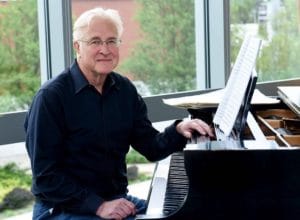Meet Paul Moravec, winner of the 2004 Pulitzer Prize in Music. Paul has composed over one hundred orchestral, chamber, choral, lyric, film, and electro-acoustic compositions. He has been described in Opera News as “a masterful musical dramatist,” and his music has been hailed as “tuneful, ebullient and wonderfully energetic” (San Francisco Chronicle), “riveting and fascinating” (NPR), and “assured, virtuosic” (Wall Street Journal).

Have you been able to collaborate with other composers/artists during the lockdown?
I’ve been making an operatic, staged version of Sanctuary Road with the librettist Mark Campbell. We’re also collaborating on a new oratorio for Oratorio Society of New York about the history of voting rights in America.
In May, Mark and I collaborated with Opera America and a team of very talented professionals and over 100 opera singers to make a virtual performance of our choral work Light Shall Lift Us. It’s up over 23,000 views on YouTube.
What technology have you used to continue to do your work in a virtual world? Have you used any music apps? Do you have any suggestions on the best way to record ensemble singing?
Not much has changed — as always, I use the low-tech resources of piano, paper, and pencil (and eraser!) and the higher tech resources of Sibelius Music Notation program for composing.
You received the 2004 Pulitzer Prize in Music. This is an enormous honor. How did it feel to win such an award and has it changed anything for you?
Being awarded the Pulitzer in 2004 changed my life immediately and materially, opening up lots of commissions and performance opportunities, among other things. It was and remains a thrilling development in my career.
Can you talk a little about your composing process?
Every project is different and needs to be approached on a case-by-case basis; hard to generalize. I always begin at the piano, and as the piece evolves, I usually input what I come up with into Sibelius, which I find a VERY useful compositional tool as well.
The Shining is a piece that most would not consider turning into an opera. Why did you decide to write this and what were some of the challenges?
The idea of making an opera out of The Shining came from stage director Eric Simonson and from then-artistic director of Minnesota Opera, Dale Johnson. Stephen King’s novel is actually extremely naturally operatic, as it involves the three basic aspects of opera on steroids: love, death, and power. And also lots of ghosts (!) — perfect for operatic treatment.
You have several albums available. As a composer, how did it feel to be able to release your first album and is there an album you are most proud of?
I’ve been hugely lucky to work with so many fantastic artists and institutions in making my albums, it’s really hard to pick one in particular. Sanctuary Road — Oratorio Society of New York on Naxos — is certainly the most high-profile, as it’s currently nominated for a 2021 Grammy. (Grammy Awards will be announced on March 14 this year.)
You are a graduate of Harvard College and Columbia University, you taught at Columbia, Dartmouth, and Hunter College and currently hold the special position of University Professor at Adelphi University. Academia has been an important part of your career. Why is teaching important to you?
Being an artist and being a teacher are actually complementary activities. They dovetail nicely. Both activities involve conveying values to people. In its way, making music teaches by example, whereas teaching in schools and universities involves teaching more by precept.
Of your many popular works, do you have one piece that you are most proud of?
The Shining, Sanctuary Road, A Nation Of Others, The Blizzard Voices, Tempest Fantasy, The Time Gallery, Montserrat, equally proud of these pieces.
ABOUT PAUL MORAVEC
Paul Moravec, recipient of the 2004 Pulitzer Prize in Music, is the composer of numerous orchestral, chamber, choral, operatic, and lyric pieces. His music has earned many distinctions, including the Rome Prize Fellowship, a Guggenheim Fellowship, three awards from the American Academy of Arts and Letters, and fellowships from the National Endowment for the Arts and the Rockefeller Foundation. A graduate of Harvard College and Columbia University, he has taught at Columbia, Dartmouth, and Hunter College and currently holds the special position of University Professor at Adelphi University. He was the 2013 Paul Fromm Composer-in-Residence at the American Academy in Rome, recently served as Artist-in-Residence at the Institute for Advanced Study in Princeton, NJ, and was also recently elected to membership in the American Philosophical Society.
Frequently commissioned by notable ensembles and major music institutions, Mr. Moravec’s oratorio about The Underground Railroad premiered by the Oratorio Society of New York at Carnegie Hall in May, 2018. His opera, The Shining, based on the Stephen King novel, premiered at the Minnesota Opera in May, 2016. Other recent premieres include The Overlook Hotel Suite, with American Composers Orchestra at Carnegie Hall; Winter Songs, with the Harvard Glee Club and Radcliffe Choral Society; Light Shall Lift Us, with Opera Orlando; The King’s Man, with Kentucky Opera; Amorisms, with Alias and the Nashville Ballet; Danse Russe, an opera for the Philadelphia International Festival of the Arts; Brandenburg Gate, with the Orpheus Chamber Orchestra at Carnegie Hall; Piano Quintet, with Jeremy Denk and the Lark Quartet; and Wind Symphony, with a consortium of American concert bands. Recent seasons have included the New York premiere of The Blizzard Voices, with the Oratorio Society of NY at Carnegie Hall, as well as the premieres of Violin Concerto, with Maria Bachmann and Symphony in C, and Shakuhachi Concerto, with James Schlefer and the Orchestra of the Swan (U.K.).
Mr. Moravec’s discography includes Northern Lights Electric, an album of his orchestral music with the Boston Modern Orchestra Project released in 2012 on the BMOP Sound label. He has five albums of chamber music on Naxos American Classics: Tempest Fantasy, performed by Trio Solisti with clarinetist David Krakauer; The Time Gallery, performed by eighth blackbird; Cool Fire, with the Bridgehampton Chamber Music Festival; Useful Knowledge, with soprano Amy Burton, baritone Randall Scarlata, Trio Solisti, and la Fenice Quintet; and Violin Concerto, with Maria Bachmann and Rossen Milanov’s Symphony in C. Among his many other recorded works are: Double Action, Evermore, and Ariel Fantasy, performed by the Bachmann/Klibonoff Duo (Endeavour Classics); Sonata for Violin and Pianoperformed by the Bachmann/Klibonoff Duo (BMG/RCA Red Seal); Atmosfera a Villa Aureliaand Vince & Jan, performed by the Lark Quartet (Endeavour Classics); Morph, performed by the String Orchestra of New York (Albany); Anniversary Dances, with the Ying Quartet (Dorian Records); Cornopean Airs, with American Brass Quintet and organist Colin Fowler; and Andy Warhol Sez, with bassoonist Peter Kolkay and pianist Alexandra Nguyen. Other releases include Blue Fiddle, with Hilary Hahn on Deutsche Grammophon, and Piano Quintet, with Jeremy Denk and the Lark Quartet, on Bridge Records.
His work is published by Subito Music, available at www.subitomusic.com.
